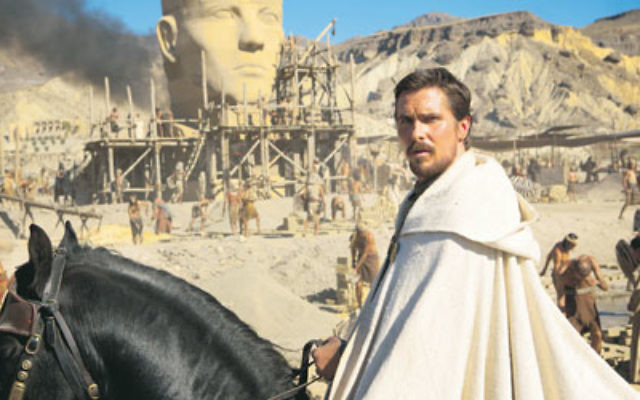Biblical blockbusters
IT’S being billed as the biggest biblical film in a decade – Exodus: Gods and Kings comes from the hand of Ridley Scott, the great sci-fi and action director responsible for films such as Alien, Blade Runner and the Oscar-winning Gladiator.
The film stars Christian Bale as Moses playing a larger-than-life action hero, alongside Australian star Joel Edgerton as Rameses. The cast includes John Turturro, Ben Kingsley, Sigourney Weaver, Palestinian actress Hiam Abbass and Ben Mendelsohn.
There’s no coincidence that Ridley Scott (who turns 77 on November 30) chose to direct Exodus: Gods and Kings – his work in directing Gladiator in 2000, which starred Russell Crowe, is credited with reinventing the modern “swords and sandals” epics once so popular on the big screen.
It was the legendary Cecil B DeMille who helped define biblical films. His 1923 silent version of The Ten Commandments, which included notable special effects of the Red Sea parting, is regarded as a classic.
It was followed by his film King of Kings (1927), which focused on the life of Jesus Christ.
DeMille’s 1949 success with Samson and Delilah is credited with kicking off the “golden age” of 1950s films based on the Bible, which included DeMille’s most memorable film, his 220-minute 1956 remake of The Ten Commandments starring Charlton Heston as Moses.
Filmed in Egypt and the Sinai Desert, it was movie-making on a grand scale. It also starred Yul Brenner as Rameses. Heston also starred in William Wyler’s epic, Ben-Hur (1959), a much less didactic film than The Ten Commandments.
Although not based on a biblical story, its setting (Roman-occupied Palestine) and its themes of slavery and Jewish nationalism placed it in the same genre.
It also provided a clear forerunner to Scott’s Gladiator, with many plot similarities.
Audiences love films with a biblical theme: The Ten Commandments is still the sixth most popular (inflation-adjusted) film ever released in North America and Ben-Hur is 13th the list.
Other notable biblical films of this period included David and Bathsheba (1951), The Robe (1953), Solomon and Sheba (1959), The Story of Ruth (1960), Esther and the King (1960), David and Goliath (1961) and Sodom and Gomorrah (1963).
In 1966, John Huston directed a financially successful three-hour version of The Bible … In the Beginning using the King James version. Huston also appeared in the film playing the role of Noah.
There have been numerous artistic re-imaginings of the story of Jesus: The Gospel According to Matthew (1966), Godspell (1973), Jesus Christ Superstar (1973), the comic Monty Python’s Life of Brian (1979), King David (1985) and The Last Temptation of Christ (1988).
In 1998, Dreamworks Pictures produced a successful animated musical of the Exodus story titled The Prince of Egypt, with Val Kilmer as the voice of Moses and Ralph Fiennes as Rameses. Among the stars whose voices were used in the film were Michelle Pfeiffer, Sandra Bullock, Jeff Goldblum and Steve Martin.
The Prince of Egypt closely follows DeMille’s The Ten Commandments story and openly acknowledges that it has freely adapted the Bible.
Unlike Mel Gibson’s The Passion of the Christ – about the final hours of Jesus – Exodus: Gods and Kings tells a story from the Tanach (Old Testament) and follows in the footsteps of this year’s Noah, the darkly entertaining epic also starring Crowe in the title role. However, director Darren Aronofsky freely rewrote the story of the biblical Noah.
When Exodus: Gods and Kings opens next week, audiences will learn how true director Scott has been to the biblical story.
Exodus: Gods and Kings opens on December 4.
REPORT by Don Perlgut
PHOTO of Christian Bale as Moses in Exodus: Gods and Kings.


comments